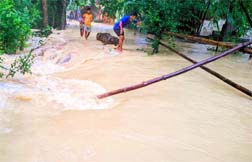C T Online Desk: 1,196 medical teams deployed; essential medical supplies are well-stocked in the hospitals.
The ongoing flash floods in Chattogram and Sylhet divisions have severely affected 40 upazilas across 260 unions, prompting a large-scale emergency response from the Bangladesh Health Ministry.
A total of 1,196 medical teams have been deployed in the flood-affected areas, providing round-the-clock assistance to the local population, said a press release from the Ministry of Health and Family Welfare on Thursday.
Health officials have ensured that essential supplies, including water purification tablets, oral rehydration solutions, cholera saline, and anti-venom, are well-stocked in the affected areas. Hospitals have been equipped with emergency medical teams, and all health workers and officials in these regions have had their leaves cancelled to ensure continuous support.
To coordinate the response efforts, divisional health directors, civil surgeons, and upazila health and family welfare officers have been instructed to work closely with other departments.
They have been directed to keep a vigilant watch on the evolving flood situation and to take preemptive measures should conditions worsen, according to the press release.
A flood control room has been established at the Directorate General of Health Services (DGHS) with a hotline number—01759114488– to maintain constant communication with all healthcare facilities across the country.
Additional control rooms have also been set up at the civil surgeon offices and the divisional director (health) offices to monitor the situation continuously.
The health ministry and the DGHS have been coordinating the overall activities related to the flood situation, ensuring a comprehensive and swift response to the crisis.
Continuous rainfall in India’s Tripura and Bangladesh has primarily caused sudden flooding in the Sylhet and Chattogram regions, with the situation intensified by the sudden opening of dams in India, according to meteorologists.
DGHS issues 8 directives
On Thursday, the DGHS issued eight directives for the head officials in the flood-hit areas including keeping control rooms open round-the-clock at all offices of civil surgeons and upazila health and family planning officers.
Other directives include: Medical teams along with first-aid facilities should be formed and kept ready round the clock for responding to disaster.
Appropriate preparations should be kept at healthcare facilities in flood-hit areas to deal with possible health risks, including diarrhoea, snake-biting and flood-related diseases.
A massive quality of water purification tablets, oral saline, and anti-venoms should be stored. Urgent and necessary medical equipment, first-aid and ambulances should be kept ready.
All physicians, nurses, other officers, and employees in flood-hit areas cannot leave workstations without receiving permission from the divisional director (health).













